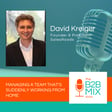
Advice for Finding Your Next Sales & Marketing Job
We know it. You know it. 2020 has kind of sucked for a lot of people.
Maybe you or a friend have experienced a job loss or feel a sense of job insecurity this year, so we decided to invite a career search expert to the show.
Our guest for this episode is Jacob Warwick, CEO of Discover Podium, an organization dedicated to helping find a more fulfilling career. During our conversation with Jacob, he shares:
- The challenges for sales & marketing professionals when looking for a job
- How to assess your career experience
- Positioning yourself for a leading career
- Performing a job search
- Things to remember when it comes to interviewing
Much of the information Jacob shares in this episode will be available in eBook format in September 2020. Be sure to check the Discover Podium website or register for our podcast email alerts to find out when the eBook will be available. It's jam-packed with valuable information and links to templates for your career search.
Connect with Jacob
If you'd like to connect with Jacob on LinkedIn, be sure to add a personal message that includes something about The B2B Mix Show and that the Jackson sisters sent you!
Jacob Warwick on LinkedIn: https://www.linkedin.com/in/jacobwarwick/.
___
About The B2B Mix Show
The B2B Mix Show with Alanna Jackson and Stacy Jackson is brought to you by Jackson Marketing. Need help with your B2B online presence? Let's talk!
Connect with us on social media:
The B2B Mix Show — Twitter, Instagram, LinkedIn, Facebook
















